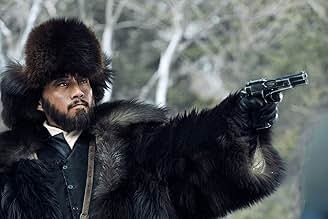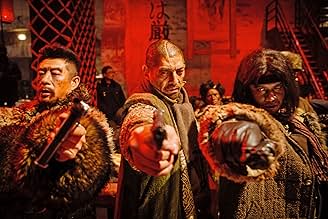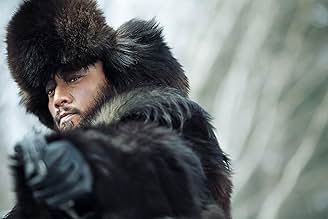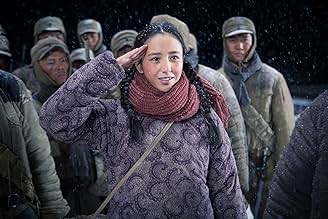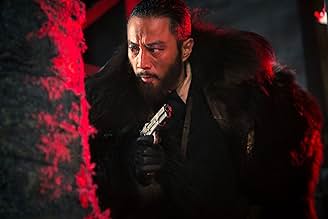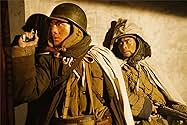La Bataille de la montagne du Tigre
Titre original : Zhi qu wei hu shan
NOTE IMDb
6,4/10
3,5 k
MA NOTE
Une histoire qui raconte le conflit entre une escouade de l'Armée populaire de libération et une troupe de bandits dans le nord-est de la Chine pendant la révolution chinoise.Une histoire qui raconte le conflit entre une escouade de l'Armée populaire de libération et une troupe de bandits dans le nord-est de la Chine pendant la révolution chinoise.Une histoire qui raconte le conflit entre une escouade de l'Armée populaire de libération et une troupe de bandits dans le nord-est de la Chine pendant la révolution chinoise.
- Réalisation
- Scénario
- Casting principal
- Récompenses
- 21 victoires et 41 nominations au total
Avis à la une
The best scene for me is the tiger attack, matches by the skills of Zhang. I rewatch it a few times, and begin to notice some 'unlikelihoods'. Even if the camara shots are breathtaking, the riffle of Zhang is a mechanism action, so you have to reload after each shot even if the chamber contains 5 cartridges (like a Muser use in WW2). During the tiger last jump, Zhang load a cartridge but fire 4 bullets, without using the action 'mechanism' ...like an automatic riffle. Zhang can go up and down the tree like an acrobat, sometimes, without even using his legs, but the tiger in unable to climb with his powerful claws. The size of the dead tiger lying on Zhang is quite exagerated... But this is OK from a cinematographic marketing. For the rest of the movie, it will be a lot greater if you keep it simple Mr Director, I mean without the theatricals and too much makeup :)
8OMTR
Epic adaptation of a classic from Chinese literature, then from Peking Opera Troupe of Shanghai, based on the real-life story of the Battle of Tiger Mountain in 1946.
Like John Woo's 'The Crossing', Tsui Hark's 'The Taking of Tiger Mountain' is set during the Civil War in the late 1940s; but instead of depicting the struggle between the People's Liberation Army and the Nationalists, Tsui and his four other screenwriters pit a certain Unit 203 of the PLA against a band of ruthless bandits whose stronghold is located high up in the snowy Tiger Mountain. Key to the PLA's strategy was a certain Yang Zirong, who infiltrated the bandits' stronghold and provided vital information which enabled his unit to triumph guerrilla-style against their more numerous and more well-equipped enemies.
No matter that he has been made to look like Hugh Jackman's Wolverine, Zhang Hanyu commands every single moment he is on screen as Zirong with a compelling performance of nuance and gravitas. While Lin Gengxin plays the righteous leader of Unit 203 Shao Jianbo with conviction and Tony Leung Kar-Fai is suitably hammy as the bandits' leader Lord Hawk, it is Zhang who truly owns the entire film, and it is no coincidence that his character is the most fully formed one of a movie which sometimes struggles to find the right balance of tone between fiction and history.
That is perhaps inevitable given the slightly uneasy fit between material and filmmaker. Much as Tsui Hark is no stranger to epics, he isn't exactly the sort of filmmaker who tells a straightforward historical tale – even his arguably most popular 'Once Upon A Time in China' trilogy about the legendary folk hero Wong Fei Hung was embellished with his penchant for the theatrical. And so it is with his latest, which depicts the heroism of the 203 Unit with the sort of self-serious posture which historical accounts typically adopt but the loutishness of the bandits with the sort of eccentricity that made his fantasy epics such as 'The Legend of Zu' and the more recent 'Detective Dee' enjoyable flights of fancy.
Amidst the tonal shifts, Zhang more than holds his own as Tsui's protagonist, an enigmatic stranger who joins the 203 with the medical officer Bai Ru (Tong Liya) and is at first met with doubt and scepticism by Jianbo. It is Zirong who comes up with the plan for him to go undercover by bringing to Lord Hawk a much coveted map with the locations of treasure left by the fleeing Japanese at the end of the Sino-Japanese war, and also to his quick-witted credit that he manages to win the trust of Lord Hawk to be sworn in as one of the league of brothers.
It is a shaky one though – not only is he tested from within by his Second Brother (Yu Xing) who stages a mock invasion by the PLA and Lord Hawk's woman Qinglian (Yu Nan) who is under orders to try to seduce him, Zirong's identity is also threatened when a spy planted by the bandits within the villagers escapes after a failed attack by the former on the PLA soldiers protecting the latter. Such moments of genuine tension are perfectly positioned to keep the narrative taut, which largely unfolds as a buildup to the storming of the bandits' fortress on the eve of New Year's Eve on the occasion of Lord Hawk's birthday.
Quite unlike the typical Tsui Hark movie therefore, this one has clearly fewer setpieces; indeed, we count just three – the first encounter between the PLA 203 Unit and the bandits at an abandoned warehouse; the failed attack led by Fifth and Sixth Brother on the village protected by the same unit; and finally the incursion of Lord Hawk's bastion to annihilate his reign of tyranny once and for all. Nonetheless, apart from some gimmicky slo-mo shots meant to justify the price of 3D for those who paid to see it with the additional dimension, these setpieces unfold with the scale and spectacle that one would expect from Tsui, the latter two in particular pop with thrill and imagination using a combination of old-school stunt staging and some nifty modern day CG effects.
Not quite so successful is Tsui's attempt to capture the poignancy of the historical event – besides Zirong, the rest of the PLA heroes are portrayed with as much dimension as a propaganda film commissioned by the Chinese government itself, especially when their enemies are cast as their complete opposites. A sub-plot based upon the reunion of mother and son – the latter a young boy named Knotti the 203 Unit rescues and the former who turns out to be Qinglian – is too manipulative to be persuasive, even more so when it is used to bookend the narrative with a prologue and a coda set in 2015.
Notwithstanding Tsui's autobiographical intent, the nexus that Tsui draws with present day is stretched most tenuously with an utterly unnecessary alternate ending that sees the Wolverine-lookalike Zirong turn into the very superhero by trying to rescue Qinglian from a twin-propeller plane that Lord Hawk is trying to take off in from a private airstrip in the mountain. As far as analogies go, this is a perfect example of the Chinese saying 'draw snake add feet' – so much so that its inclusion almost takes way what legitimacy Tsui had tried to build into the story in the first place.
As probably his first historical epic, 'The Taking of Tiger Mountain' sees Tsui Hark struggle to find the right balance between reality and myth. Tsui's best films have been those which have allowed him to express his own inner eccentricities, but which prove out of place in a straightforward recount like this. The narrative flaws are all too obvious at the start and at the end, but thankfully, as far as the titular tale is concerned, Tsui has fashioned a gripping story of espionage that does history justice.
No matter that he has been made to look like Hugh Jackman's Wolverine, Zhang Hanyu commands every single moment he is on screen as Zirong with a compelling performance of nuance and gravitas. While Lin Gengxin plays the righteous leader of Unit 203 Shao Jianbo with conviction and Tony Leung Kar-Fai is suitably hammy as the bandits' leader Lord Hawk, it is Zhang who truly owns the entire film, and it is no coincidence that his character is the most fully formed one of a movie which sometimes struggles to find the right balance of tone between fiction and history.
That is perhaps inevitable given the slightly uneasy fit between material and filmmaker. Much as Tsui Hark is no stranger to epics, he isn't exactly the sort of filmmaker who tells a straightforward historical tale – even his arguably most popular 'Once Upon A Time in China' trilogy about the legendary folk hero Wong Fei Hung was embellished with his penchant for the theatrical. And so it is with his latest, which depicts the heroism of the 203 Unit with the sort of self-serious posture which historical accounts typically adopt but the loutishness of the bandits with the sort of eccentricity that made his fantasy epics such as 'The Legend of Zu' and the more recent 'Detective Dee' enjoyable flights of fancy.
Amidst the tonal shifts, Zhang more than holds his own as Tsui's protagonist, an enigmatic stranger who joins the 203 with the medical officer Bai Ru (Tong Liya) and is at first met with doubt and scepticism by Jianbo. It is Zirong who comes up with the plan for him to go undercover by bringing to Lord Hawk a much coveted map with the locations of treasure left by the fleeing Japanese at the end of the Sino-Japanese war, and also to his quick-witted credit that he manages to win the trust of Lord Hawk to be sworn in as one of the league of brothers.
It is a shaky one though – not only is he tested from within by his Second Brother (Yu Xing) who stages a mock invasion by the PLA and Lord Hawk's woman Qinglian (Yu Nan) who is under orders to try to seduce him, Zirong's identity is also threatened when a spy planted by the bandits within the villagers escapes after a failed attack by the former on the PLA soldiers protecting the latter. Such moments of genuine tension are perfectly positioned to keep the narrative taut, which largely unfolds as a buildup to the storming of the bandits' fortress on the eve of New Year's Eve on the occasion of Lord Hawk's birthday.
Quite unlike the typical Tsui Hark movie therefore, this one has clearly fewer setpieces; indeed, we count just three – the first encounter between the PLA 203 Unit and the bandits at an abandoned warehouse; the failed attack led by Fifth and Sixth Brother on the village protected by the same unit; and finally the incursion of Lord Hawk's bastion to annihilate his reign of tyranny once and for all. Nonetheless, apart from some gimmicky slo-mo shots meant to justify the price of 3D for those who paid to see it with the additional dimension, these setpieces unfold with the scale and spectacle that one would expect from Tsui, the latter two in particular pop with thrill and imagination using a combination of old-school stunt staging and some nifty modern day CG effects.
Not quite so successful is Tsui's attempt to capture the poignancy of the historical event – besides Zirong, the rest of the PLA heroes are portrayed with as much dimension as a propaganda film commissioned by the Chinese government itself, especially when their enemies are cast as their complete opposites. A sub-plot based upon the reunion of mother and son – the latter a young boy named Knotti the 203 Unit rescues and the former who turns out to be Qinglian – is too manipulative to be persuasive, even more so when it is used to bookend the narrative with a prologue and a coda set in 2015.
Notwithstanding Tsui's autobiographical intent, the nexus that Tsui draws with present day is stretched most tenuously with an utterly unnecessary alternate ending that sees the Wolverine-lookalike Zirong turn into the very superhero by trying to rescue Qinglian from a twin-propeller plane that Lord Hawk is trying to take off in from a private airstrip in the mountain. As far as analogies go, this is a perfect example of the Chinese saying 'draw snake add feet' – so much so that its inclusion almost takes way what legitimacy Tsui had tried to build into the story in the first place.
As probably his first historical epic, 'The Taking of Tiger Mountain' sees Tsui Hark struggle to find the right balance between reality and myth. Tsui's best films have been those which have allowed him to express his own inner eccentricities, but which prove out of place in a straightforward recount like this. The narrative flaws are all too obvious at the start and at the end, but thankfully, as far as the titular tale is concerned, Tsui has fashioned a gripping story of espionage that does history justice.
Every December, in the China mainland, is the protective month for Chinese productions in local multiplexes, practically all the foreign tent-poles are pushed back and it is also the most profitable period for this vastly booming market. This year, the two main contenders are GONE WITH THE BULLETS (2014), Wen Jiang's much-hyped follow-up to the massively successful LET THE BULLETS FLY (2010, 8/10) and this Hark Tsui's latest offer of a 3D spectacle retelling a legendary battle during the period of Chinese Civil war. Nevertheless the former receives some unexpected backlash from critics and audience, which prompts me to pick the latter, plus I am bringing my parents, who will feel more related to the story since they know the original tale very well.
Much exceeding my expectation, this is by far the most amazing 3D Chinese film I have ever watched in the theater, breathtakingly sets out the vast North East snowfield where the story unfolds, without compromising the luminance of the screen. Despite that the film starts with a modern-day prologue in New York, which inconveniently enforces a weird sense of incongruity with the main event, the first impression is pretty awesome, however, this subplot will continue to distract viewers out of the picture every so often and largely banks on heart-throb Gen Han's presence.
The story takes place in 1947, a Communist detachment named 203 lead by Jianbo (Kenny Lin) fights against the bandit chieftain Cinereous Vulture (Leung), who takes over the Tiger Mountain with his eight warriors and thousands of bandits, plus heavy arms left by Japanese after the Anti-Japanese War (1937-1945), including artilleries, cannons and a tank. Hogging the vantage point, they constantly attacks the villages nearby and becomes a major threat in the turf. Whereas the detachment has only 30 soldiers altogether with much lighter weaponry. There is only one way to win this battle against heavy odds, to circumvent the head-on confrontation and outwit the enemy by an audacious sneak attack.
So Zirong Yang (Hanyu Zhang), a singular soldier, proposes an undercover scheme, he volunteers to infiltrate into the gang and look for a weak link in their defense system, so they can capture them all at one swoop. The mission is an adventurous one full of pitfalls and any small slip will cost Yang's life, Hanyu Zhang embodies this lone hero bravura with enthralling excitement and poise, confidently delivers bandit's cant and liberates his masculine charisma as a military man. Hong Kong veteran Tony Ka Fai Leung, almost unrecognizable here as the villain, easily stands out with his flashy and distinctive outfits, so is his eight warriors, all have been upgraded with eye-popping apparel and apparatuses. By contrast, the Communist soldiers are far more plain and conventional. Kenny Lin outstrips his youthful greenness, strenuously leaves an impression of being mature and serious. With six screenwriters credited, they enrich the film with adequate suspense, sporadic humor, the routine sacrifice and female presence (e.g. Nan Yu owns her dramatic outburst in a crudely sketched characterization).
Hark Tsui has ventured into 3D technology since two DETECTIVE DEE films and the dismaying FLYING SWORDS OF DRAGON GATE (2011, 3/10), so finally he reaches the benchmark with this one, along with the dashing bullets and grenades slo-motion, he also schemes a prolonged alternative ending after the credits, just to show that now the industrial special effects craftsmanship is no interior compared with the Hollywood criterion. One can grudge about the final coup de main is way too easy to accomplish, but for anyone who is familiar with the current status of Chinese cinema, it is a good relief we can dish up such an entertaining blockbuster independently, and its box-office prospect is quite promising too, a sure-fire to reach a career-high for the maestro Hark after 35 years in the line.
Much exceeding my expectation, this is by far the most amazing 3D Chinese film I have ever watched in the theater, breathtakingly sets out the vast North East snowfield where the story unfolds, without compromising the luminance of the screen. Despite that the film starts with a modern-day prologue in New York, which inconveniently enforces a weird sense of incongruity with the main event, the first impression is pretty awesome, however, this subplot will continue to distract viewers out of the picture every so often and largely banks on heart-throb Gen Han's presence.
The story takes place in 1947, a Communist detachment named 203 lead by Jianbo (Kenny Lin) fights against the bandit chieftain Cinereous Vulture (Leung), who takes over the Tiger Mountain with his eight warriors and thousands of bandits, plus heavy arms left by Japanese after the Anti-Japanese War (1937-1945), including artilleries, cannons and a tank. Hogging the vantage point, they constantly attacks the villages nearby and becomes a major threat in the turf. Whereas the detachment has only 30 soldiers altogether with much lighter weaponry. There is only one way to win this battle against heavy odds, to circumvent the head-on confrontation and outwit the enemy by an audacious sneak attack.
So Zirong Yang (Hanyu Zhang), a singular soldier, proposes an undercover scheme, he volunteers to infiltrate into the gang and look for a weak link in their defense system, so they can capture them all at one swoop. The mission is an adventurous one full of pitfalls and any small slip will cost Yang's life, Hanyu Zhang embodies this lone hero bravura with enthralling excitement and poise, confidently delivers bandit's cant and liberates his masculine charisma as a military man. Hong Kong veteran Tony Ka Fai Leung, almost unrecognizable here as the villain, easily stands out with his flashy and distinctive outfits, so is his eight warriors, all have been upgraded with eye-popping apparel and apparatuses. By contrast, the Communist soldiers are far more plain and conventional. Kenny Lin outstrips his youthful greenness, strenuously leaves an impression of being mature and serious. With six screenwriters credited, they enrich the film with adequate suspense, sporadic humor, the routine sacrifice and female presence (e.g. Nan Yu owns her dramatic outburst in a crudely sketched characterization).
Hark Tsui has ventured into 3D technology since two DETECTIVE DEE films and the dismaying FLYING SWORDS OF DRAGON GATE (2011, 3/10), so finally he reaches the benchmark with this one, along with the dashing bullets and grenades slo-motion, he also schemes a prolonged alternative ending after the credits, just to show that now the industrial special effects craftsmanship is no interior compared with the Hollywood criterion. One can grudge about the final coup de main is way too easy to accomplish, but for anyone who is familiar with the current status of Chinese cinema, it is a good relief we can dish up such an entertaining blockbuster independently, and its box-office prospect is quite promising too, a sure-fire to reach a career-high for the maestro Hark after 35 years in the line.
Very interesting action adventure with some impressive camera work. The action sequences are amazing and the film is totally unpredictable. The tiger scene was incredible! I loved the film, effects, story and music. Very well done.
Le saviez-vous
- AnecdotesThe Tiger is a Siberian Tiger. The largest of the cats.
- ConnexionsRemake of Lin hai xue yuan (1960)
Meilleurs choix
Connectez-vous pour évaluer et suivre la liste de favoris afin de recevoir des recommandations personnalisées
- How long is The Taking of Tiger Mountain?Alimenté par Alexa
Détails
Box-office
- Montant brut aux États-Unis et au Canada
- 228 984 $US
- Week-end de sortie aux États-Unis et au Canada
- 50 621 $US
- 4 janv. 2015
- Montant brut mondial
- 141 654 055 $US
- Durée2 heures 21 minutes
- Couleur
- Mixage
- Rapport de forme
- 1.85 : 1
Contribuer à cette page
Suggérer une modification ou ajouter du contenu manquant

Lacune principale
By what name was La Bataille de la montagne du Tigre (2014) officially released in Canada in English?
Répondre


